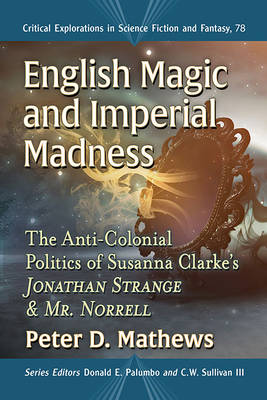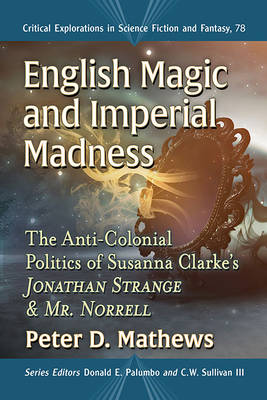
- Retrait gratuit dans votre magasin Club
- 7.000.000 titres dans notre catalogue
- Payer en toute sécurité
- Toujours un magasin près de chez vous
- Retrait gratuit dans votre magasin Club
- 7.000.0000 titres dans notre catalogue
- Payer en toute sécurité
- Toujours un magasin près de chez vous
English Magic and Imperial Madness
The Anti-Colonial Politics of Susanna Clarke's Jonathan Strange & Mr. Norrell
Peter D MathewsDescription
Regency England was a pivotal time of political uncertainty, with a changing monarchy, the Napoleonic Wars, and a population explosion in London. In Susanna Clarke's fantasy novel Jonathan Strange and Mr. Norrell, the era is also witness to the unexpected return of magic. Locating the consequences of this eruption of magical unreason within the context of England's imperial history, this study examines Merlin and his legacy, the roles of magicians throughout history, the mythology of disenchantment, the racism at work in the character of Stephen Black, the meaning behind the fantasy of magic's return, and the Englishness of English magic itself. Looking at the larger historical context of magic and its links to colonialism, the book offers both a fuller understanding of the ethical visions underlying Clarke's groundbreaking novel of madness intertwined with magic, while challenging readers to rethink connections among national identity, rationality, and power.
Spécifications
Parties prenantes
- Auteur(s) :
- Editeur:
Contenu
- Nombre de pages :
- 178
- Langue:
- Anglais
- Collection :
- Tome:
- n° 78
Caractéristiques
- EAN:
- 9781476686271
- Date de parution :
- 10-11-21
- Format:
- Livre broché
- Format numérique:
- Trade paperback (VS)
- Dimensions :
- 148 mm x 222 mm
- Poids :
- 226 g

Les avis
Nous publions uniquement les avis qui respectent les conditions requises. Consultez nos conditions pour les avis.






